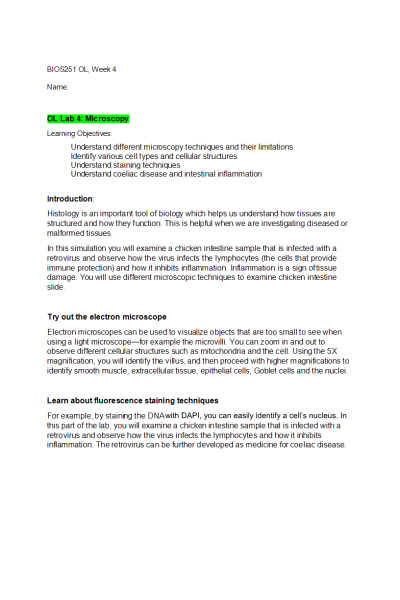BIOS 251 Week 4 Lab; Microscopy
-
$15.00
| Institution | BIOS 251 Anatomy and Physiology I with Lab |
| Contributor | Stella |
OL Lab 4: Microscopy
Learning Objectives:
- Understand different microscopy techniques and their limitations
- Identify various cell types and cellular structures
- Understand staining techniques
- Understand coeliac disease and intestinal inflammation
Introduction:
Histology is an important tool of biology which helps us understand how tissues are structured and how they function. This is helpful when we are investigating diseased or malformed tissues.
In this simulation you will examine a chicken intestine sample that is infected with a retrovirus and observe how the virus infects the lymphocytes (the cells that provide immune protection) and how it inhibits inflammation. Inflammation is a sign of tissue damage. You will use different microscopic techniques to examine chicken intestine slide.
Try out the electron microscope
Learn about fluorescence staining techniques
Part 1: Complete Labster Microscopy Part 2: Report and Reflection
Purpose:
- Describe in your own words and in complete sentences, the purpose of this experiment.
- The purpose of this experiment was to show the differences between the 3 microscopes we used and how to use each of them, while also learning the different kinds of magnifications and what we can see at each level.
- Observations: List 3 observations you have made in this simulation.
- Answer all the questions below:
- Distinguish the light microscope from the electron microscope.(1 point)
- Draw the three types of muscle tissue (3 points)
- What type of cells lines the intestinal lumen?(1 point)
- Provide the function of the following cell junctions: (4 points)
- Tight junctions:
- Adherens junctions:
- Gap junctions:
- Desmosomes:
- Reflection: Reflect on at least 2 key concepts you have learned from this simulation. How would you relate it to the physiological functions of the body?
| Instituition / Term | |
| Term | Year 2022 |
| Institution | BIOS 251 Anatomy and Physiology I with Lab |
| Contributor | Stella |

































